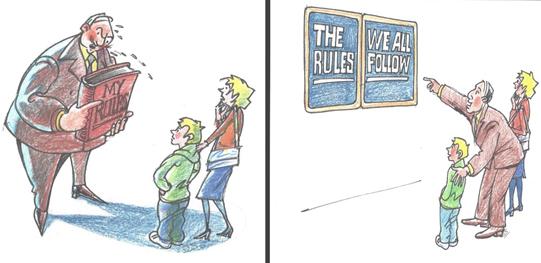These two words, which share so many letters, mean two directly opposite things, beautifully illustrated by the image above. Let's start by looking at the definitions for each (I used the Cambridge Online Dictionary for this):
Authoritative: having the power of special knowledge; showing that you are confident; having complete and accurate information; being in control and therefore respected and obeyed.
Authoritarian: demanding total obedience to those in positions of authority and refusing to allow people the freedom to act as they wish.
Now we have those clear explanations, what does it mean to us as parents?
It is not difficult to tell which of these sounds more socially acceptable in today's world. But some people do think that children should be totally obedient to their parents because their parents are "in authority". Boundaries and family hierarchies are important. Even in the most harmonious family there are times when the practical solution to whatever is troubling you is to 'pull rank'. We don't have to apologise for that and there are some reflections on this in an earlier blog, "Are you seeking control over or co-operation from your children?", where we explain why a co-operative family is better for everyone than a controlled family.
Re-framing authoritative and authoritarian approaches
Now let's reframe these two words as 'authentically authoritative' versus 'in-authentically authoritative' and look again at their definitions:
- Do you as a parent have 'special knowledge'?
- Are you are a confident parent?
- Is your 'information' about the situation complete and accurate?
If you can answer yes to all three of these questions, then you will find that your actions will be authentically authoritative; this makes it far more likely that your children will comply with you. However, if you aren't in that position you are more likely to come across as in-authentically authoritarian, forced to impose your will by power plays and demanding obedience. Your children will be much more likely to become oppositional, which then leaves you with two choices: be even more coercive and dominant, or give away control to your children.
Two approaches with very different outcomes
If your underlying message is ‘You are being bad - either confront me or comply’ then if your child is unwilling (or unable - important distinction there!) to comply, they will have only one alternative - to confront you and challenge your authority.
However, if the underlying message to your child is ‘You are in control and have the freedom to make the right choices’ then the child is not boxed into a corner, and may be more willing to negotiate, comply, or discuss more rationally without defiance.
In essence, it’s worth avoiding the authoritarian approach. Instead you could try using tactical ignoring, humour, wit, and appreciative enquiry, whilst also making sure that the child understands your real needs for making the request. If you do have 'special knowledge', or more complete and accurate information about the situation, then share this - express your feelings honestly, and start by asking the children to do what you want rather than demanding they obey.
If you can't be authentically authoritative, then it is worth pausing. If you can, wait until you're able to answer 'yes' to those three questions above. Stop and reflect; re-evaluate what you are trying to achieve; look at the situation in a different light - perhaps there are new and different 'facts' you have not been paying attention to? Why not talk to your children about the situation and see what they have to say about it? The best time to do this is not when you are in the situation, but later, when you find yourself in a teachable moment with your child.
Once the moment is right, and you are ready to make your request with authentic authority, observe whether this results in your child making the choice to respond with greater compliance. How does this make you feel, and how does it make them feel afterwards?

